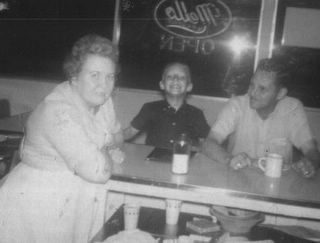In the telling of the story...

My mom, me as a kid and my dad at the counter of my mom's restaurant. If you placed your finger on the neon sign in the background, it would hum loudly and shock your finger lightly.
When I was about 5 years old, my Mom rented and managed a restaurant next door to the Texaco station and general store that my Dad operated. The two businesses were located only about 30 feet from one another and the space in-between the buildings and surrounding each of them was paved with white concrete. It was the kind of pavement that collects the brilliance of the sun and reflects it back into your eyes so that every image seems to have the sharpness of a black and white photograph. The buildings were painted with a dull white paint that further focused the sunlight. During Carolina summers along Highway 421, the sun was intense. The heat and humidity were stifling.
The restaurant was housed in a rectangular building with a flat roof. The main salon of the building seated about 60 people, and typical of truck stops and diners in the South in the 1950's, had a counter with stools that could be spun around and around to the annoyance of the customers trying to eat their lunch in peace. Behind this counter were all of the grills, toasters, steamers, milkshake blenders, steam tables, and the like that were used to prepare "short orders". To the far right of the counter, nestled in the wall over the steamer was a small window that led into another room. This room could be entered by a door leading to the outside--or from the kitchen. It was this room that I had come to accept as a combination playroom, storage room and room to accommodate the local blacks who came to buy food but who were not allowed to eat in the same facilities as the local whites. They were allowed to speak through the window to a white server, to pay through the window, to receive their food from the window, but not to enter the main dining room.
On this particular summer day, I, already deniably self-confident and light afoot, pulled the heavy door that led out into the blinding white sunlight and flung myself out into the world. I had started without any particular purpose over to the store to see my Dad, but stopped in my tracks when I saw a large white sedan wheeling into the driveway. The car had been headed toward the beaches only an hour distant, but a pit-stop was apparently needed. As the car came to a stop in front of my Mom's restaurant, I walked over to the driver's window and peered inside. A family of 5 black people was about to descend from the vehicle when I, repeating the lessons that I had been taught implicitly from observations, stated plainly and clearly "You have to use the back room." The driver who had been smiling at me asked "What?" and I said that "colored people" could only be served from the back room. He cursed, ordered everyone back into the car, started and revved the engine and threw the car in reverse. As they drove away, they left black rubber squeal marks on the white concrete driveway.
Now, I will never know who that man was, but I will never forget what I learned from him. I learned that you can change a smile to an angry grimace with mere words. I learned that sometimes rules don't make sense when you really think about them. I learned that sometimes following the rules could ultimately make you feel badly. I learned that the true nature of mankind can be extremely misguided to the point that whole societies are built upon dysfunctional behavior. I learned that I had a choice in each and every situation of either upholding or not a set of rules. I even learned that a five-year-old armed with the wrong weapons could severely wound the soul of an adult. Just think what adults could do to each other....or worse, to children. Or maybe I learned all these lessons in the telling of this story.
In the meantime, and ironically, I spent my days in the company of Bertha Mae Murphy. A dear soul, very loving and affectionate, she was always wrapped tightly by an apron and was rotund so that when I threw my arms around her waist, they only went so far. She and my mom were the two people who were constant at our restaurant. Most of the waitresses came and went according to their age and year in High School. Bertha, though, was like my second mother and was as likely to hold me on her lap as my own mom.
She had her own family: two children. I knew her son and daughter fairly well from being with their mom. The daughter had "gone up the road" to Poughkeepsie, NY as a teenager and eventually moved back home. I don’t honestly know if she was the first black person to walk in, sit at the counter in my mom’s restaurant and order a meal, but I remember that she did it. Soon, others would do the same and after many years, the small window in the back room was rarely used. I have to give Bertha’s daughter credit for having the courage to change the patterns of behavior by being present. I wonder if there were ever discussions in their home about relative propriety versus freedom.
I can imagine now, being a gay man whose civil rights are denied, what it was like to be told that you were not deemed suitable to be seated with other people in a society. What a hurtful, soul-destroying concept. If that is your world, how can you expect anything beyond submission? You would think that we would have learned the lesson that societies function best when people are taught inclusion rather than exclusion. After all, we are only as good as how we treat our most vulnerable. When we take into account our values, our debts and balances as a society, we have to count everyone and all situations as valid or we are only lying to ourselves about our worth.
Categories: memories segregation racism favorites








4 Comments:
The Tar-Heel Tavern
Hey, this post is beautiful...but you choose what you want to send in:
Tar Heel TavernCall for submissionsTar Heel Tavern
there's a poem for you on my blog :)
amy
oh cool! I am off to look at it!
Ron
Post a Comment
<< Home